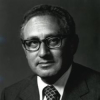Henry A. Kissinger

Henry A. Kissinger
Henry Alfred Kissingeris an American diplomat and political scientist. He served as National Security Advisor and later concurrently as United States Secretary of State in the administrations of presidents Richard Nixon and Gerald Ford. For his actions negotiating the ceasefire in Vietnam, Kissinger received the 1973 Nobel Peace Prize under controversial circumstances, with two members of the committee resigning in protest. Kissinger later sought, unsuccessfully, to return the prize. After his term, his advice has been sought by world leaders...
NationalityGerman
ProfessionStatesman
Date of Birth27 May 1923
CountryGermany
We are here because cooperative relations with China are in the American national interest. Every president for 30 years has come to that conclusion, and a rejection of this agreement would be a vote for an adversarial relationship with the most populous nation of China.
My heart goes out to the president because I've served in an administration that faced a very divided country in a very difficult set of circumstances.
I think the only way to go is to do what they think is the right thing and explain it as well as they can to the American people, as the president is attempting to do with these speeches. The public will not forgive you for losing even if it seems to reflect what they thought they wanted.
The Vietnam War required us to emphasize the national interest rather than abstract principles. What President Nixon and I tried to do was unnatural. And that is why we didn't make it.
Administration has managed the extraordinary feat of having, at one and the same time, the worst relations with our allies, the worst relations with our adversaries, and the most serious upheavals in the developing world since the end of the Second World War.
We are all the President's men.
President Nixon in his inaugural address indicated that he wanted an era of negotiation. Our reasoning was that whatever our ideological differences, whatever our geopolitical differences, we were condemned to coexistence by nuclear weapons.
Whenever a new president comes in, people that are used to the previous president wonder if he has the same capacity.
I have said there are three principles that should be followed. One, we should maintain the "one China" policy that every American president has articulated, including President Reagan. Secondly, we should make clear that we want a peaceful resolution. And three, Taiwan should not challenge that arrangement in a way that will provoke a conflict. Those are three perfectly clear principles. I haven't used any of the other slogans.
It is an act of insanity and national humiliation to have a law prohibiting the President from ordering assassination.
It is not unreasonable for us to desire some options. Some Europeans, I know, believe it is necessary that we guarantee our own destruction to give them the assurances they claim they need. However, to deprive ourselves of options is to paralyze us. ... What do we mean by control of escalation?
It is hard to believe that Kay is no longer among us. But in a way, she will never leave us. Her place in this country will not be filled, nor the void her death leaves on the lives of her friends,
We'll do it in the quickest way possible that is compatible with foreigners and making sure that when the report is finished, there can be no question about the fact that every aspect has been explored, ... Late Edition With Wolf Blitzer.
I want to get into the President's head some idea of what he can do. If military actions are recommended to him for decision, I want him to know what he is doing when he decides.